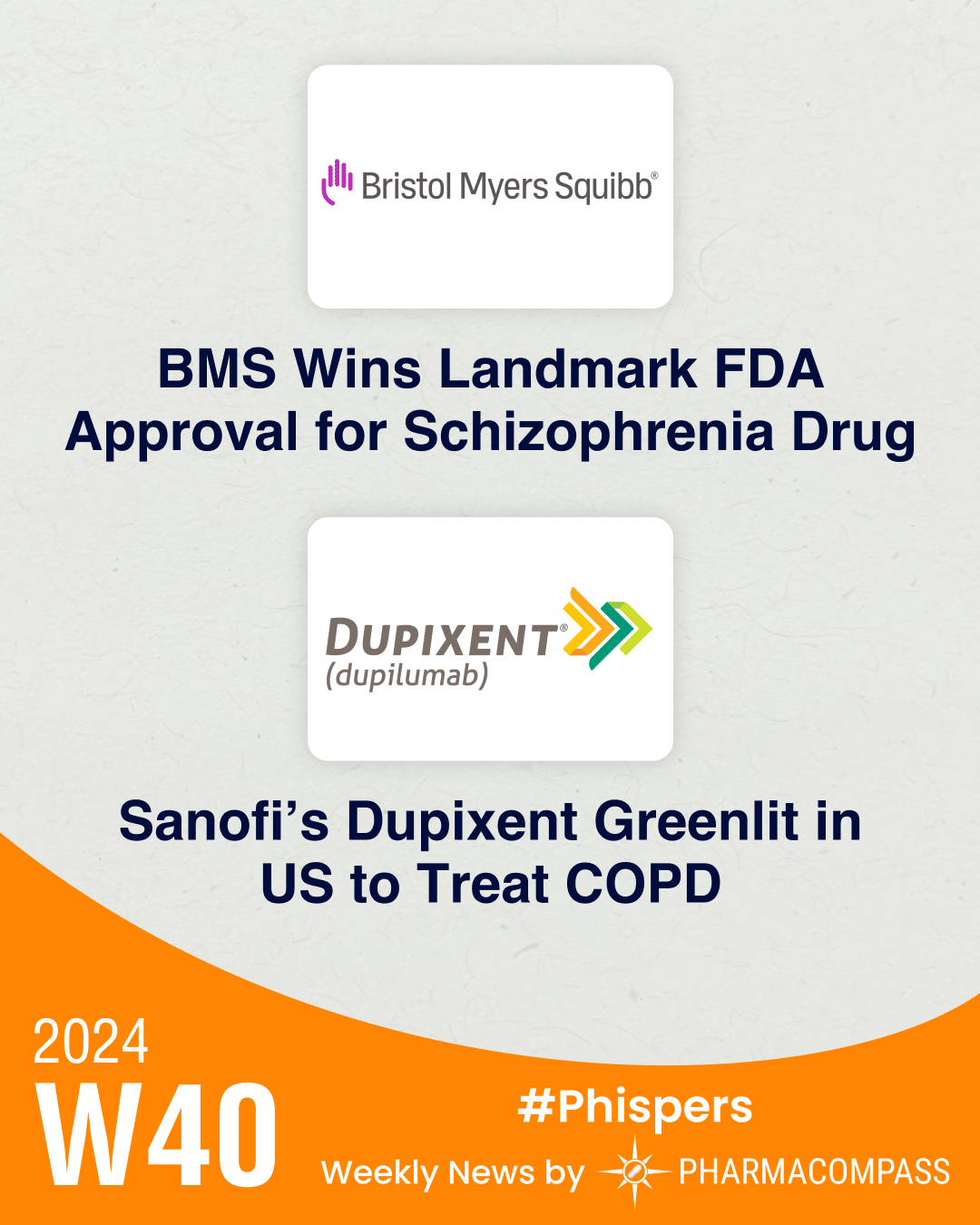
By PharmaCompass
2024-10-03
Impressions: 991 (Article) || 11 (Video)
In this week’s Phispers, the US Food and Drug Administration (FDA) approved Bristol Myers Squibb’s groundbreaking schizophrenia drug Cobenfy. The approval validates BMS’ US$ 14 billion acquisition of Karuna Therapeutics.
Additionally, BMS successfully defended itself against a US$ 6.4 billion lawsuit related to the delayed approval of its cancer drug Breyanzi. The drugmaker also signed a potential US$ 3.6 billion T-cell therapy deal with Prime Medicine.
Among other notable approvals, Sanofi and Regeneron’s Dupixent became the first biologic approved in the US for treating chronic obstructive pulmonary disease (COPD) and AstraZeneca’s Tagrisso gained FDA approval for a certain inoperable lung cancer, becoming the first targeted therapy for this indication.
Eli Lilly is investing US$ 4.5 billion to create a new center in Indiana (US) for advanced manufacturing and drug development. Similarly, Johnson & Johnson announced a US$ 2 billion investment in a new North Carolina manufacturing facility that is expected to create 420 jobs.
Pfizer sold a US$ 3.26 billion stake in Haleon, reducing its holding to 15 percent while remaining the company’s biggest shareholder.
Meanwhile, Gilead has licensed its groundbreaking HIV drug lenacapavir free of charge to six generic companies in Asia and North Africa.
In trials, AbbVie’s US$ 8.7 billion acquisition of Cerevel Therapeutics showed promise as tavapadon, a once-daily Parkinson’s disease drug, met primary and secondary endpoints in a late-stage trial, demonstrating significant improvements in motor function and patient mobility.
BMS’ US$ 14 bn Karuna bet pays off with landmark approval for schizophrenia drug
BMS’ KarXT (xanomeline and trospium chloride) won a landmark FDA approval for treating schizophrenia. Branded Cobenfy, the drug is the first-ever antipsychotic that targets cholinergic receptors. Ever since antipsychotics first began being used to treat schizophrenia in the 1950s, they have worked by blocking a dopamine receptor. But antipsychotics have been associated with serious side effects like weight gain, high rates of cardiac disease, early death and patients complaining that they leave them sluggish and unmotivated. Cobenfy’s new approach has experts excited, and its peak sales are expected to come in at US$ 7.5 billion a year, validating BMS’ US$ 14 billion acquisition of Karuna Therapeutics (announced in December 2023).
Judge tosses US$ 6.4 bn lawsuit over Breyanzi: BMS won the dismissal of a US$ 6.4 billion lawsuit filed by former Celgene shareholders, alleging it intentionally delayed the approval of Breyanzi (lisocabtagene maraleucel) and two other drugs to avoid contingent value rights (CVR) payouts. BMS had acquired Celgene in 2019 for US$ 74 billion.
Inks potential US$ 3.6 bn T-cell therapy pact with Prime: BMS has entered into a partnership with Prime Medicine that could potentially run up to US$ 3.6 billion, including an upfront payment of US$ 110 million. The collaboration to develop reagents for ex vivo T-cell therapies (i.e. therapies in which immune cells are engineered outside of the body and then reintroduced to patients) aims to leverage Prime’s gene editing technology to enhance BMS’ immuno-oncology pipeline.
Sanofi’s Dupixent becomes first biologic in US to treat COPD
FDA has expanded the label of Regeneron and Sanofi’s mega-blockbuster drug, Dupixent (dupilumab), to include the treatment of COPD. Already a game-changer in treating conditions like asthma and atopic dermatitis, Dupixent becomes the first-ever biologic medicine for COPD patients in the US. The fully human monoclonal antibody is easily Sanofi’s best-selling drug and analysts expect sales in 2030 to come in at over € 21 billion (US$ 23.5 billion), with US$ 2.9 billion coming from COPD.
Astra’s Tagrisso gets FDA nod for inoperable lung cancer: Months after AstraZeneca’s Tagrisso (osimertinib) posted impressive phase 3 results, the drug received FDA approval for treating inoperable, stage 3 epidermal growth factor receptor-mutated (EGFRm) non-small cell lung cancer (NSCLC). This makes Astra’s blockbuster the first targeted therapy for the indication.
Lilly to invest US$ 4.5 bn in advanced drug development center in Indiana
The biggest pharma company in the world by market cap, Eli Lilly, is investing US$ 4.5 billion to create a new center in its home state of Indiana (US). The Lilly Medicine Foundry for advanced manufacturing and drug development will give the Mounjaro maker the ability to research new ways of producing medicines, while also scaling up manufacturing of drugs for clinical trials. The Medicine Foundry will be located in Indiana’s LEAP Research and Innovation District in Lebanon, Indiana, and will enhance the company’s investment there to over US$ 13 billion.
J&J to invest over US$ 2 bn to build new manufacturing facility in North Carolina
Johnson & Johnson has announced an investment of over US$ 2 billion to build a new manufacturing facility in Wilson, North Carolina (US). The new facility will expand production of the company’s portfolio and pipeline of innovative biologics in support of J&J’s broader plan to advance over 70 novel therapies and product expansion filings and launches by the end of the decade. The investment is expected to create approximately 420 full-time jobs with construction set to begin in the first half of 2025.
Pfizer sells US$ 3.3 bn stake in Haleon: Pfizer has offloaded about US$ 3.26 billion worth of its stake in Sensodyne and Panadol maker Haleon. The sale reduces Pfizer’s holding in Haleon to 15 percent. Pfizer remains Haleon’s biggest shareholder. It had sold about US$ 3.5 billion worth of Haleon shares in March while GSK had divested its entire stake in May.
AbbVie’s US$ 8.7 bn Cerevel buy pays off with late-stage Parkinson’s win
AbbVie’s Parkinson’s disease drug tavapadon, which came its way via its US$ 8.7 billion acquisition of Cerevel Therapeutics, met with positive results in a late-stage trial. Being studied as a once-daily treatment for Parkinson’s, the 5 mg and 15 mg doses of tavapadon demonstrated significant improvements in motor function for patients, meeting its primary endpoint. The secondary endpoint of improving the mobility of patients in their daily lives was also met.
Gilead licenses its HIV shot to 6 generic makers to boost access in poor countries
Gilead has licensed its groundbreaking HIV drug lenacapavir free of charge to six generic companies in Asia and North Africa. The six companies have access to sell the highly effective, twice-yearly jab in 120 countries with the highest rates of HIV, including sub-Saharan Africa. They include India’s Dr Reddy’s Laboratories, Emcure, Hetero and Mylan, as well as Egypt’s Eva Pharma and Pakistan’s Ferozsons Laboratories.
The PharmaCompass Newsletter – Sign Up, Stay Ahead
Feedback, help us to improve. Click here
Image Credit : Phisper Infographic by PharmaCompass license under CC BY 2.0
“ The article is based on the information available in public and which the author believes to be true. The author is not disseminating any information, which the author believes or knows, is confidential or in conflict with the privacy of any person. The views expressed or information supplied through this article is mere opinion and observation of the author. The author does not intend to defame, insult or, cause loss or damage to anyone, in any manner, through this article.”







